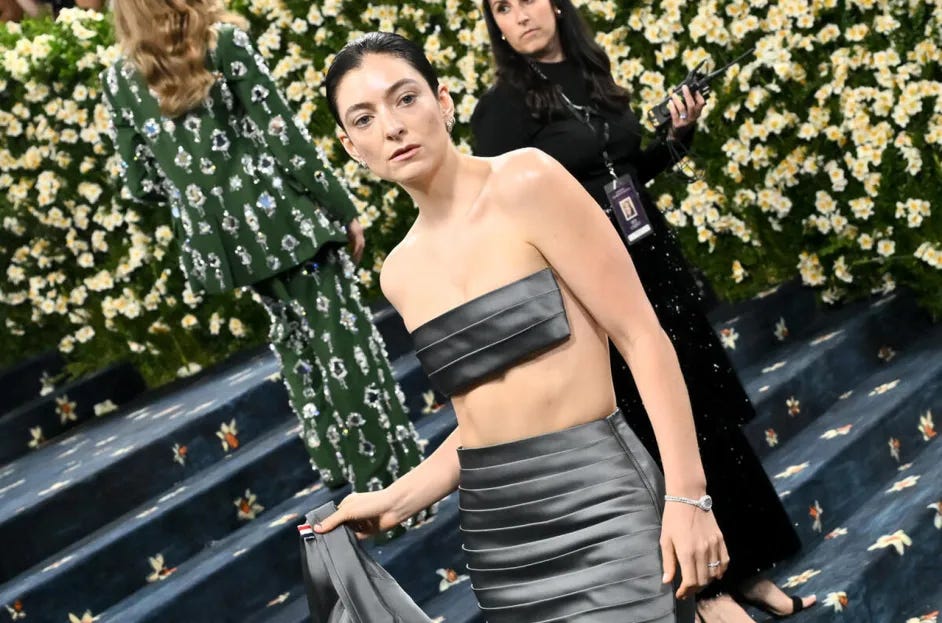Dissecting Lorde's new album and the key to her continued success
She can't keep getting away with this!
It is remarkable how ubiquitous Lorde’s audience is. She’s a 28-year-old pop star from New Zealand who takes psychedelics and calls backyards “back gardens.” Why do millions of teenage fans in the U.S. resonate so intimately with her lyrics?
I missed the whole Pure Heroine wave — except “Ribs” of course — because I was 9 when it came out. (I also used to mix up Lorde and Lana Del Rey… My bad!) Thankfully, when Melodrama came out, I was a fully conscious human being at the big age of 12, so I do remember its release and every album since.
From Pure Heroine to Virgin, I think a key piece of Lorde’s appeal is her ability to remove her lyrics from space and time without losing any specificity. Her songs are all about the details. “Clearblue” is my favorite song on her new album, Virgin, for this very reason.
It’s a song about testing for pregnancy with a Clearblue-brand pregnancy test, but it evokes so much more than that. It’s a picture of raw vulnerability and absurdity.
She’s waiting for a flimsy little plastic stick to reveal whether her life is about to change. By emphasizing the brand’s name with the song title, she’s drawing listener’s attention to the madness of finding out life-or-death information from a tiny device you can buy at CVS. The detail of the lyrics makes the moment real.
“Oh, wish I'd kept the Clearblue
I'd remember how it feels to
Be so bare in the throes”
She wishes she had kept the pregnancy test as a symbol of the “bare” feeling of waiting for its result. What an image! Keeping a little plastic stick with a brand name on it because it reminds you of a strong emotion.
Testing for pregnancy with an at-home test is something deeply connected to gender, to female identity or lack of it, to a certain moment in time that many women go through — but it’s also universal. It is a perfect metaphor for a complete loss of control. It’s on-brand for the gender-exploration themes of the album, and very situated in the present moment, but it also extends far past its circumstances.
Like “Clearblue,” a lot of Lorde’s aesthetic choices and marketing decisions for Virgin are timely, especially in regards to the current political climate. She released “Man of the Year” as a single with a unique cover photo where she wears silver masking tape over her chest. Rather than being sexual and feminine, the cover insinuates that she’s using the tape as a binder like those some transgender people wear.
In a viral Rolling Stone interview, she said “I’m a woman except for the days when I’m a man.” However, she clarified that she doesn’t want to “take any space from anyone who has more on the line than me. Because I’m, comparatively, in a very safe place as a wealthy, cis, white woman.”
Obviously, as Lorde acknowledges, a pop star exploring gender a little bit isn’t groundbreaking news, but I do think it adds to the album’s relevance in this specific cultural moment. Across the world, inclusive sexuality and gender policy is under attack, so it’s nice to see a big celebrity implicitly support the trans community through her own personal journey.
Lorde is no stranger to addressing the global context for her work. Her 2018 album, Solar Power is not a climate change call to action — she explicitly said she is a pop star, “not a climate activist” — but it does reference our world’s growing environmental panic.
I find her refusal to be a policy expert really charming. I’ve long been a believer that celebrities do not need to comment on current affairs, because we should be looking at actual experts and journalists for those answers. She knows who she is! A pop star — and that’s why we like her!
Let me return to my question from the beginning of this post: what is the reason for Lorde’s widespread appeal? I think it’s a combination of two things: 1) the oxymoron of her detailed yet universal lyrics and 2) the self-awareness she imbues into her persona.
People love Lorde because she is genuine. No, she’s not a climate activist, or a pioneering trans icon, or a normal girl in her 20s, but she knows that, and that knowledge is evident in her music. In an age of aggressive personal branding and skeptical audiences, an artist that projects an authentic identity is a rare gem.
Everyone wants to appear honest and unfiltered, but with Virgin, Lorde — or an insanely talented marketing team — achieves the impossible and makes us feel like we’re listening to her real, authentic self.



